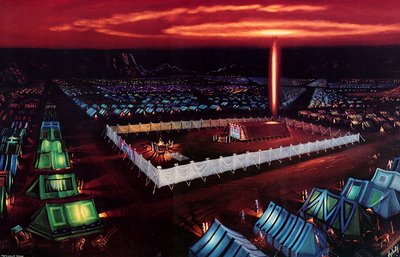
[By day the LORD went ahead of them in a pillar of cloud to guide them on their way and by night in a pillar of fire to give them light, so that they could travel by day or night. Neither the pillar of cloud by day nor the pillar of fire by night left its place in front of the people. Exodus 13:21-22]
The speaker, Pastor Rok Ee Kim, repeatedly emphasized that God commanded Moses and the people of Israel in the desert to build the Tabernacle exactly as He had instructed, to the last minute detail.
No detail was trivial. Nothing was approximate or optional.
In this Revival, Pastor Kim said, the Tabernacle will be used as a motif, a pattern, to learn of a progression of deeper and more spiritual prayer that ushers us into the very throne room of God.
So ultimately, this revival is about the discipline of prayer.
She began with a testimony of how God used her, but I won't belabor the details here.
Suffice it to say, she knows what she's talking about.
Our own EM had begun on Monday of this week the 21-Day Dinner-Fasting Prayer meetings (using Bishop Oh's Prayer-Driven Life) held each morning at 6:05am.
And what a timely revival this is!
Throughout the next three weeks we will be focusing on prayer - allowing the Holy Spirit to discipline us so that we may live a life of prayer.
Reading, meditating or studying the Word of God without a disciplined life of prayer can easily becomes a snare for intellectual arrogance and snobbery.
Praising worship songs to Jesus without a disciplined life of prayer often demonstrates no more than hype.
Pastor Kim emphasized the necessity of all three disciplines - prayer, praise, Word - coming together in harmony in the life of a true believer. For such a child of God, nothing can hinder his or her relationship to the Father.
Over the next several posts, I will do my best to regurgitate what Kim MSN taught during the evening meetings and morning prayers (she leads these also).
May our lives be one of ceaseless prayer to our living God!

2 comments:
wow.
i just read Exodus 25-31 for the first time today (sad but true).
His instructions are soooo so so specific, it's amazing. Also, it's so interesting to know what man was capable of in that time (craftsman wise)... like, the perfume maker, embroiderer, etc.
i have a question though. You know how there is the Holy Place and the Most Holy Place? Is that kind of how churches are today? Like, i know when we go up to the platform where moksaneem preaches, we have to take off our shoes because it's "holy". Is that the idea?
The concept of taking our shoes off surprisingly does NOT originate from the strictly Biblical notion: As far as I know, only Korean pastors do that. And it is out of respect. Most church leaders would say it is due to how God told Moses to remove his shoes when he encountered God in the wilderness, but I have a strange suspicion it is more a cultural phenomenon than not.
As for the Most Holy Place, it does NOT mean that "high" place only pastors or elders step on, for God's presence is not limited to a place anymore. Of course that does not mean we can treat any pulpit with carelessness and disrespect, but it is not because it is "holy ground" per se that we cannot step onto it: it is a way of honoring God saying only those ordained formally (viz, Pastors and Elders) should step on it.
Personally, I believe it should be open to anyone God anoints to serve him.
In American churches, this notable respect for the pulpit is not so poignant.
Leave it to Koreans to formalize everything.
=P
Post a Comment